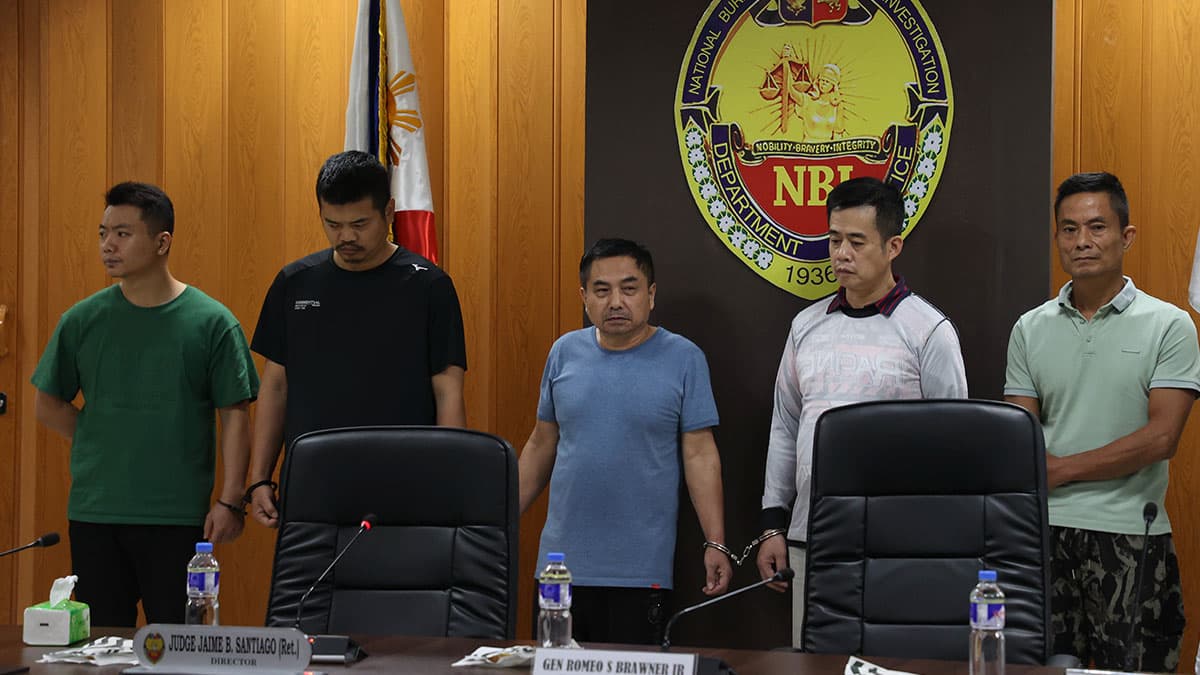Bill imposing tougher penalties on espionage moves forward in Senate

The five Chinese nationals suspected of espionage in Palawan and in Manila are presented by the National Bureau of Investigation in a press conference on Jan. 30. —MARIANNE BERMUDEZ
MANILA, Philippines — Several senators have rallied behind a measure that would impose a life imprisonment and up to P50 million fine against those who would be found spying in the country.
The stiffer penalties against espionage were contained in Senate Bill No. 2980 known as “An Act Defining and Penalizing Espionage and Other Offenses Against National Security.”
The bill was endorsed for plenary approval on Tuesday by the Senate committee on national defense.
READ: Estrada pushes anew for bill expanding anti-espionage law
“If this will eventually become a law, this will serve as a warning to all spies who are here in the country,” Senate President Pro Tempore Jinggoy Estrada, panel chairman and author of the bill, said in his sponsorship speech.
Article continues after this advertisement“Get out! Leave now and stop spying in the Philippines if you don’t want to rot in prison. Don’t even try to interfere or meddle with this,” he said.
Article continues after this advertisement“Let’s get rid of the spies, especially the Chinese,” Estrada added.
The senator noted that existing laws penalize espionage with only up to 30 years jail term and a maximum fine of P30,000, which he considers as “nothing more than a slap on the wrist.”
The proposed measure then seeks to increase the penalty to life imprisonment without the benefit of parole and a fine of P20 million to P50 million.
It will also expand the coverage of espionage to include cyber-attacks and digital/electronic access and transmission of information.
These technologies, according to Estrada, “are currently beyond the reach” of the existing law, “simply because they don’t exist 84 years ago when the law was conceived and implemented.”
“I humbly seek the support of my esteemed colleagues in moving this important and timely piece of legislation forward in order to address a clear and present danger and correct the weaknesses in our laws,” the senator then said.
READ: Senate bill seeks stricter penalties for foreign interference
Senate Majority Leader Francis Tolentino, and Senators Joel Villanueva and Juan Miguel Zubiri, manifested their support for the bill.
“I’d like to put into the record that the amendment of our almost 84 years old Espionage Act is crucial,” Villanueva stressed.
“The passage of this measure will definitely enhance our prevailing law to make it more applicable to the present, especially in the era of modern m technology. We should also be equipped against cyber espionage and digital warfare,” he added.
Both Villanueva and Zubiri requested that they may be made co-sponsors and co-authors of Estrada’s bill.
“We join him in our vigilance to protect our shores in and outside of our territorial waters and inland domains,” Zubiri said.
Tolentino joined them, saying “the time to act is now” in order to address the challenges of the current security landscape.
“Let’s unite in our efforts to pass this legislation and safeguard our nation’s future,” he said.
“As a co-sponsor, I likewise urge our fellow lawmakers to join us in supporting this measure. Together we can ensure our legal framework is equipped to handle current and future threats to national security,” he further said.














